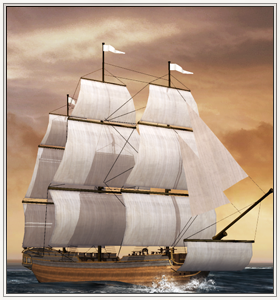Indiaman (ETW unit)
| Indiaman | |
|---|---|

| |
| Range: | 500 |
| Accuracy: | 40 |
| Reloading skill: | 30 |
| Hull strength: | 1938 |
| Speed: | 14 |
| Maneuverability: | Low |
| Morale: | 6 |
| Turns to build: | 2 |
| Recruitment cost: | 600 |
| Upkeep cost: | 50 |
| Requires | |
| Building (minimum level) | |
| Trading Port | |
The Indiaman is an armed merchant ship, strongly built for the trade routes between Europe and the East. It is not a warship, but can defend itself in need.
The Indiaman is a three-masted, square-rigged sailing ship of some 1000 tons displacement. Although work for the relatively small crew is hard, there are compensations: they can trade goods in their own right, and make excellent profits by doing so.
Unusually for a merchant ship, an Indiaman carries cargo, passengers, and a good number of guns. Intended to sail from Europe to the other side of the world and back carrying valuable – sometimes priceless – cargoes, these ships have to be able to defend themselves. The passengers expect some creature comforts, being both officers of the owning trade companies and assorted “gentlemen” seeking their fortunes in foreign parts.
Historically, East Indiamen resembled ships of the line, both in their general configuration and paintwork. At the Battle of Pulo Aura (1804), the ambiguous appearance and aggressive handling of a squadron of British Indiamen completely humbugged the French admiral, Charles-Alexandre Linois. He withdrew in the face of “superior” forces. Commodore Nathaniel Dance, of the British Company fleet, received a knighthood and a handsome reward for his cunning.
National navies purchased Indiamen and converted them into troopships or warships.
Technological abilities
Available for:
| |
|
|
|
|
|
| |
|
|
|
